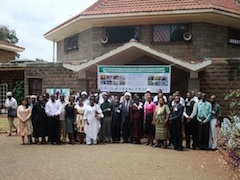| |
|
 |
Nairobi ARC workshop on religion and environmental teaching
March 6, 2012:
 |
 |
 |
Over 50 delegates attended the Education Workshop in Nairobi, March 2012. |
Education workshop on religious values and environmental teaching More than 50 teachers and faith leaders from Christian and Muslim groups in sub-Saharan Africa are meeting in Nairobi, Kenya, this week to discuss how to integrate religious values into education on sustainable development in faith schools.
And they were delighted to hear that both the Kenyan Ministry of Education and the National Environment Management Authority (NEMA) not only support their efforts but are keen to help.
Dr Ayub Macharia, acting director general of NEMA, told the workshop yesterday: “The intervention of faith groups is timely and likely to have an enormous impact, especially as faith organisations are involved in 50% of schools.
“This workshop could not have been more timely. NEMA is willing to partner with you as you move forward – we will support you technically and also financially. I want you to know you have a partner in NEMA.”
Religious values are 'central'Encouraging words also came from Bibian Chege, assistant director (quality assurance) at the Ministry of Education, who said the Ministry was not only promoting education for sustainable development but wanted religious values, such as love, peace, faithfulness, justice, to be included in all teaching.
“Religious values are central to our education system. A sound religious education is necessary to ensure sound moral values,” she said.
The Ministry is currently looking at how to deepen the teaching of moral and ethical values in primary schools and for that reason the Ministry is very interested in this initiative by faith schools, said Bibian Chege.
The week-long workshop, which runs to March 10, has been organised by ARC and the Kenyan Organisation for Environmental Education as part of a project to develop an education toolkit for faith schools in Kenya. Currently environmental education is taught through individual subjects in Kenyan schools, rather than as a subject in its own right, but nowhere is the faith mandate for taking action to protect the planet emphasised.
Toolkit for faith primary schools
That’s why ARC has commissioned the KOEE to develop a toolkit that integrates religious values in education for sustainable development for faith primary schools in Kenya. KOEE has been working in the area of education for sustainable development since 1997, and runs an eco-schools programme and national eco-school award competition in Kenya.
Attending the workshop are representatives from the Methodist Church of Kenya, the Anglican Church of Kenya, the Catholic Church, the Presbyterian Church of East Africa and the Muslim Secretariat in Kenya.
Once the toolkit is completed later this year, the plan is for it to be adapted for use elsewhere in sub-Saharan Africa, and for that reason, representatives from several other countries are also attending the workshop.
They include the Evangelical Presbyterian Church of Ghana, the National Muslim Council of Tanzania, the Presbyterian Church of Cameroon, a Muslim school in Cameroon, the Ugandan Muslim Youth Assembly, the Catholic Archdiocese of Abuja, Nigeria, and the Quaddirriyah Sufi movement of Nigeria.
What is education for sustainable development?
The United Nations promotes education for sustainable development as a way of guiding and motivating people to work towards sustainable livelihoods, participate in a democratic society and live in a sustainable manner. It includes environmental education and teaching on core values.
For more information on the ARC/KOEE project, read our Education leaflet here.
|
 |
 |
|
|
|
|
|
 |
How does ARC work with the faiths?
We list some of the far-reaching ways that faiths can affect their environment |
 |
Education and Water
ARC's programme linking faith schools with water and sanitation issues started in 2009. Now we are working with UNICEF and other bodies to help children have better access to clean water |
 |
Projects overview
A complete listing of all current ARC projects |
 |
 |
|
|

